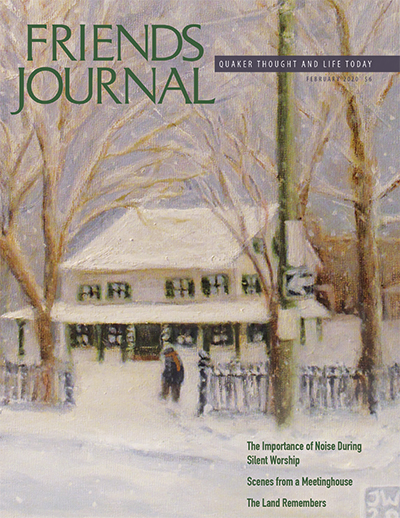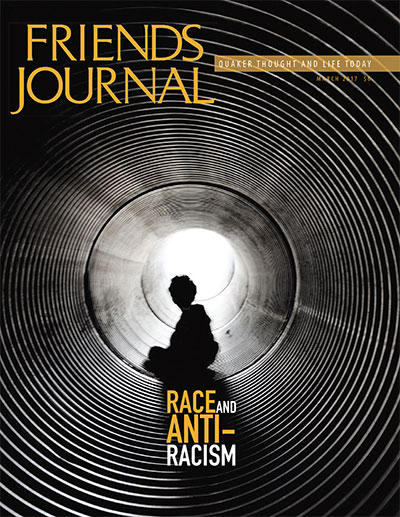When help is available
Thank you for “Drugs and the Practice of Spiritual Discernment” (by Joe McHugh, FJ Jan.). The recent holiday season was very stressful for me. I do not take any drugs, but I think professional help can be most helpful to develop patience and personal insight, and to move toward actions to help oneself. Being stoic and “strong” can be miserable. I do not believe our God wants us to suffer when help is available.
Arleen
Houston, Tex.
After working in the addictions field for many years, I would add that people who suffer from the addiction like the author’s friend are often self-medicating. I worked on a dual diagnosis unit where we helped people to discern if the basis of their addictive behavior was in fact more effectively managed by antidepressant medication.
Dan Anthon
Sarasota, Fla.
Looking beyond biology
In response to Elizabeth Boardman’s reflection, “Male, Female, or Whole?” (FJ Jan.), Quaker suffragists at the 1848 Seneca Falls Convention in New York understood the equality of human nature. Today, the American Psychological Association says that “men and women are basically alike in terms of personality, cognitive ability and leadership.” Recent research has discredited the idea that testosterone is responsible for aggressive behaviors. This leads to the conclusion that human nature is essentially androgynous. We need to look beyond biology for why we continue to insist that there are separate feminine and masculine interests in our society. We are the ones continuing the myths of difference.
Sue Styer
Geneva, Ill.
Pronominal change
Thank you for “A Call to Work Outside Our Circles” (FJ Jan.), C. Wess Daniels’s response to Teresa M. Bejan’s New York Times opinion piece about pronouns. My husband and I are involved in activism in our city, and part of several nonprofits. This is the joy of retirement! One of our longtime enjoyments is leading the Vancouver Peace and Justice Fair. We connect with people of other denominations, faiths, and types of diversity. I haven’t said much about being a Quaker. I feel like I have the opposite problem: working with others outside my Quaker circle, but not knowing how much to share about being a Quaker.
Since I have several people in my life who are not using the pronouns “he” or “she,” I get mixed up about who is using which pronoun. I like the idea of saying “friend” as a pronoun. I’ll try that out a bit and see how it goes!
Kay Ellison
Vancouver, Wash
I found Teresa M. Bejan’s op-ed in the New York Times hard to understand. She says that “… trans, nonbinary and genderqueer activists have promoted the use of gender-inclusive pronouns such as the singular ‘they/their’ (instead of ‘he/him’ or ‘she/her’).” Apparently, this practice is controversial: is it a form of equality to recognize someone’s identity or is it an excess of sensitivity?
How is the history of the Religious Society of Friends relevant? Quakers followed a policy of linguistic divergence using plain speech as a rejection of the values of the mainstream society. Bejan says, “they thee-ed and thou-ed their fellow human beings without distinction as a form of egalitarian social protest. And like today’s proponents of gender-inclusive pronouns, they faced ridicule and persecution as a result.”
According to Bejan (and every linguist in the world), language reflects our social reality, but it can also change our social reality. Bejan is right to point out that using “they” to speak about either a man or a woman is already quite common: “When a politician votes, they must consider the public mood.” This is not generally considered grammatically correct, but it is the pragmatic choice in speaking and used frequently in writing.
The most telling sentence in Bejan’s article is this one: “More fittingly, if applied to everyone, ‘they’ would complete the leveling-up progress of equal dignity that ‘you’ started centuries ago.”
When we go around the meetingroom introducing ourselves and say our names and some of us identify our pronouns of choice, we should all say “they/them.” The Quaker stand on equality, social justice, and inclusion should put us on the side of pronominal change. Let’s just use they/them for everyone when we speak of people in the third-person singular.
Let that be our twenty-first-century plain speech.
Barbara Birch
Emeryville, Calif.
As an intersex adult (my body isn’t typically male or female, an occurrence as common as red hair) and lifelong Quaker, I am delighted to see Friends meetings strive to find ways to be more open and inclusive toward qenderqueer people like myself.
Friends have been so about taking on the practice of pronoun sharing that they fail to see the fail. To assume that all people have a pronoun is incorrect and can be harmful to those of us who don’t. For me, pronoun sharing is a post-traumatic stress trigger to the medical abuse I had as a child. I was subjected to surgeries that were meant to reinforce my anatomical sex. The “good intentions” to give me a more female body actually caused a neutering affect and left me with no gender identity at all. I am not alone in this reality, but the details are so personal that many intersex people can’t talk about them. We certainly don’t want to be forced to make public statements about our genitals’ surgical alterations. Having a gender identity is a privilege so basic that many cisgender people (someone whose sense of personal identity and gender corresponds with their birth sex) don’t yet understand that they have it. Imagine how welcome people with no food would feel if we invited them to a brown bag lunch so they could watch us eat.
Another problem with pronoun sharing is that some of us are uncomfortable when the entire room turns to see what pronoun we’ll use. This happens more often than it should and is very stigmatizing. Many genderqueer Friends prefer to share our personal information much more privately, which is a reality that cisgender people just don’t have to deal with.
But my biggest concern about pronoun sharing is that of cultural appropriation. Pronoun sharing is something that genderqueer people have to do to explain ourselves in public settings. Having been a genderqueer activist for over 40 years and misgendered most of my life, I totally respect the need and the right for other genderqueer people to share their pronouns. The genderqueer community created the practice of pronoun sharing to fight our oppression by making the world see us for who we are. It’s just not okay to take a tool we created to fight our oppression and assume the right to use it to share one’s privileged identity. To do so just makes it less about genderqueer people and our culture. We don’t declare our privilege around race or class to be inclusive to low-income people or people of color so why are Friends doing that with sex and gender?
Surely Quakers are clever enough to find a way to stand up for genderqueer people by using practices that are more about genderqueer people and less about announcing ourselves. We could put a banner out front that invites genderqueer people to join for worship. We could add an invitation in announcements at rise of meeting that welcomes genderqueer people to share their pronouns if they wish. We could have book groups and learn more about the rich diversity of genderqueer experiences.
Genderqueer people work hard and painfully to be seen for who we are and to create a culture with communities where we can be both honest and safe.
Esther Leidolf
Jamaica Plain, Mass.
Telling our stories
Thank you, Chloe, for telling this chapter of your story so tenderly and fully (“My Journey as a Transgender Quaker,” an interview with Chloe Schwenke, QuakerSpeak.com May, recently featured as one of the most-viewed QuakerSpeak videos of 2019). Watching it has helped me understand my daughter’s story just a little bit better. She has been reticent to talk about the depression and suicidal thinking she faced before she came to recognize that she has to transition. She is so much happier now, though still a “loner” by nature it seems. She seems to know herself and to be whole now—at last. She’s also best friends with her former partner with whom she had over twenty years of history before she began transitioning with the support of immediate family and good friends. We are blessed to have her, and now to know a bit of your story, too.
Lesley Laing
Monteverde, Costa Rica
Children’s journeys of spiritual growth
It’s wonderful to read the young people’s responses in Melinda Wenner Bradley’s “I Am a Quaker” (FJ Dec. 2019). I too have been raised in a Quaker family, but of my siblings I am the only current member of a meeting. Maybe if we’d had a chance to go to a Quaker school instead of public schools, my sisters might be more interested. They are married to men who are not Quakers but share Quaker values. I worked for Philadelphia Yearly Meeting for nine years and was a member of Upper Dublin (Pa.) Meeting before I transferred my membership back to Minnesota’s Twin Cities Meeting in 2001.
Terry Irish
St. Paul, Minn.
I may have to repeat some of Bradley’s queries with the youth in my First-day class, which includes middle school and high school grades. As adults, we sometimes lose sight that children are partners in our journey of spiritual growth. This is a brilliant reminder!
Rich Schiffer
Ridley Park, Pa.
Sustaining mutual friendships
Around the world there is an ever-growing category of people who define themselves as “spiritual but not religious” (“Can Quakerism Survive?” by Donald W. McCormick, FJ Feb. 2018). These people are not atheist or agnostic. They are, in my view, essentially Quakers. They make up over 20 percent of the U.S. population and nearly 60 percent of Europe’s.
More people than ever believe that they can experience God’s guidance without the need of church or clergy. Jesus’s direct teachings (love God, love thy neighbor, keep God’s commandments) remain widely accepted by over 80 percent of the U.S. population, even among millennials.
Why are Quaker meetinghouses increasingly empty when Quaker beliefs are increasingly popular? We hardly need to come to meeting just to sit in silence for an hour. Even Christ himself guided us to pray in secret, not to be seen by men “like the hypocrites do” (Matt. 6:5–6).
So what is the role of Quaker community? In my view, the answer is right in our name: Friendship. George Fox initially called the group he started “Friends of the Truth.” Later this became the Religious Society of Friends. Friendship was at the core of Quaker community life at the beginning.
Based on what has been written in the online comments section of McCormick’s article, it seems that over time other concerns (for example, activism) have supplanted friendship as the core of Quaker community life. This, it seems to me, is the critical error, not because activism isn’t important, but because our friendships must come first. Without them there will be no community.
My vision of a Quaker future is a focus on building and sustaining our mutual friendships at all ages, starting from the very youngest First-day school and youth programs. They should include afterschool activities like soccer teams and potlucks. If kids know they will see their friends at meeting and have a good time, they won’t stop coming at middle school (or any age).
Varthan
Virginia
I am from England, but I now live in Scotland. My grandparents were Quakers and conscientious objectors in the Second World War. I dropped out of Quaker meetings a few years ago because spirituality seemed not as important as politics to some members. I now attend Episcopalian church services, and I feel at home. It’s strange, but I feel more in tune with fundamental Quaker beliefs when I am with my Christian Episcopalian friends. The Society of Friends is not what it used to be.
Sophie Hamilton
UK
What is our guilt?
I’ve never voted or sat on a jury. I’ve never brought a lawsuit against someone, and I wouldn’t call the police if someone broke into my home.
Does voting for someone who will start or continue a war make us as guilty as those who actually kill or those who order it to be done? If we call the police, and they kill someone to stop a crime perpetrated against us, does that make us guilty of that violence? Does sitting on a jury that condemns a man to prison make us guilty of the same violence or threat of violence required to keep that prisoner in confinement?
Mitch Olsen
Chapman, Okla.






Comments on Friendsjournal.org may be used in the Forum of the print magazine and may be edited for length and clarity.